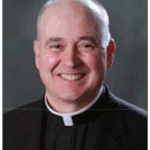(Pastor’s Note from the Mary Immaculate of Lourdes Parish Bulletin for January 24, 2016)
The yearly Octave Week of Prayer for Christian Unity is always held between the dates of January 18th-25th. It falls, significantly, between two feasts of the Princes of the Apostles, Saints Peter and Paul: January 18th, formerly the Feast of St. Peter’s Chair at Rome, and January 25th, the Conversion of St. Paul. This is a reminder to us that the unity for which we pray is a unity centered on the Person of Jesus Christ in His Church founded on the authority He gave to His Apostles. It is not a vague, sentimental thing.
One of the expressed goals of the Council Fathers at Vatican II was to further the cause for Christian unity and the healing of historic divisions. In the Dogmatic Constitution on the Church (Lumen Gentium) the Fathers declared:
These Christians [not in communion with the Roman Catholic Church] are indeed in some real way joined to us in the Holy Spirit for, by His gifts and graces, His sanctifying power is also active in them and He has strengthened some of them even to the shedding of their blood. And so the Spirit stirs up desires and actions in all of Christ’s disciples in order that all may be peaceably united, as Christ ordained, in one flock under one shepherd. Mother Church never ceases to pray, hope and work that this may be achieved, and she exhorts her children to purification and renewal so that the sign of Christ may shine more brightly over the face of the Church. (Lumen Gentium 15)
One of the ways in which Christian unity has been realized in a way that rises above the divisions is in the shared experience of the Cross among Catholics, Orthodox, Anglican and Protestant in the persecutions of modern times. In his homily at the canonization of the Ugandan Martyrs Charles Lwanga and Companions, Pope Paul VI explicitly acknowledged the blood martyrdom of the Anglican Christians who had died in the same persecutions (1885-1887): “Nor should we forget those others, of the Anglican communion, who died for the sake of Christ.”
In his memoir of how he survived Soviet Communist captivity, My Thirty-third Year: a Catholic Priest in the Gulag (A.D. 1958), Gerhard Fittkau, a parish priest from German East Prussia, describes his friendship with a Protestant Pastor Theodor Goebel whom he encountered in the prison camp barracks. The two clergymen, Catholic and Evangelical, formed a close bond of Christian fellowship both to support one another and to try to minister to their fellow captives under the extreme conditions of the Siberian Gulag.
During Holy Week 1945 they agreed to have clandestine services, where one would preach to the barracks on Good Friday and the other on Easter Sunday. Fr. Fittkau recounts the message of Pastor Goebel’s Good Friday sermon:
The only sound beside the pastor’s voice was the crackling of wood in the barrel stove. He praised the mercy of Christ in forgiving the Good Thief, opening heaven to him in his last hour by the merits of His own innocent suffering. He invited his listeners to join the Good Thief and abandon the blasphemous thought that was the devil’s temptation to us now: the thought of blaming God for all this suffering. To place such blame was to make man as if he were God and to hide the great sin of mankind which is unbelief. We should rather lay that sin before Him by sincere searching of our consciences. The pastor closed his sermon with a prayer to Our Lord to be with us in our desperate condition and to say to us also when our hour would come, ‘This day thou shalt be with Me in paradise.’
